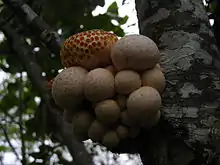Cyttaria
Cyttaria is a genus of ascomycete fungi. About 10 species belong to Cyttaria, found in South America and Australia associated with or growing on southern beech trees from the genus Nothofagus.[1] The "llao llao" fungus Cyttaria hariotii, one of the most common fungi in Andean-Patagonian forests,[2] has been shown to harbor the yeast Saccharomyces eubayanus, which may be source of the lager yeast S. pastorianus cold-tolerance.[3] Cyttaria was originally described by mycologist Miles Joseph Berkeley in 1842.[4]
| Cyttaria | |
|---|---|
 | |
| Cyttaria from Chile growing in a tree branch | |
| Scientific classification | |
| Kingdom: | |
| Division: | |
| Subdivision: | |
| Class: | |
| Order: | |
| Family: | |
| Genus: | Cyttaria Berk. (1842) |
| Type species | |
| Cyttaria darwinii Berk. (1842) | |
| Species | |
|
C. berteroi | |

Cyttaria sp. - MHNT
References
- Kirk MP, Cannon PF, Minter DW, Stalpers JA (2008). Dictionary of the Fungi (10th ed.). Wallingford, UK: CAB International. p. 192. ISBN 978-0-85199-826-8.
- Gamundd IJ, Horak E (1995). Fungi of the Andean-Patagonian Forests. Buenos Aires: Vazquez Mazzini Editores. ISBN 9509906379.
- Libkind D, Hittinger CT, Valério E, Gonçalves C, Dover J, Johnston M, Gonçalves P, Sampaio JP (2011). "Microbe domestication and the identification of the wild genetic stock of lager-brewing yeast". Proceedings of the National Academy of Sciences. 108 (35): 14539–44. doi:10.1073/pnas.1105430108. PMC 3167505. PMID 21873232.
- Berkeley MJ. (1842). "On an edible fungus from Tierra del Fuego, and an allied Chilian species". Transactions of the Linnean Society of London. 19: 37–43.
| Wikimedia Commons has media related to Cyttaria. |
This article is issued from Wikipedia. The text is licensed under Creative Commons - Attribution - Sharealike. Additional terms may apply for the media files.